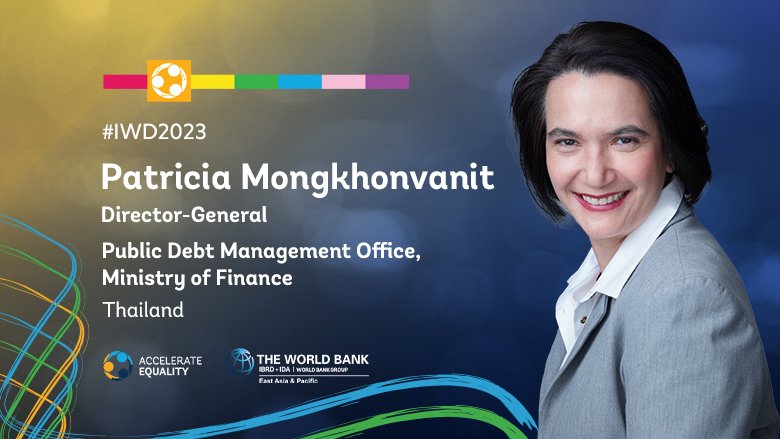Patricia Mongkhonvanit is the Director-General of the in the . She is responsible for overseeing the public debt management strategy and administration to raise funds for the Thai government budget and development projects. She has a key role in developing a domestic bond market for Thailand.
What inspired you to enter into the public finance sector?
I’ve always wanted to be a government official since I was a student at Chulalongkorn University. I hoped to be a tiny wheel that could help move the country. My major was Public Finance, and I enjoyed studying the subjects very much, as they covered all aspects of how a country’s financial mechanism works. I was determined to work at the Ministry of Finance, and I have to say that I’ve been very fortunate to work in the area that I studied, and at the place I had aimed for.
If you could describe yourself in 3 words, what would they be?
Agile, Accountable & Adventurous
This year's theme is “”. In your opinion, how can digital technology, and innovation, deliver greater gender equality?
Gender doesn’t matter in the world of digital. Technology really gives opportunities to all, if we know how to utilize it. Nowadays, many housewives no longer have to solely be housewives, nor fully depend on their husbands financially. Many are using technology to earn extra income by selling products online or creating digital content from home.
What does your profession mean to you?
While career plays very important role in my life, I am not neglecting happiness in my private and family lives. I used to consider myself a workaholic, but I realized that I have to balance my life better for the sake of my family, my team and myself.
As someone who work in the public sector. How have you seen issues of equality evolve throughout your career?
I have been in the public sector for over 25 years. Gender equality in the Thai public sector has evolved tremendously. We can see increasing numbers of women leaders in many government agencies, [and] that the number will continue to grow.
What were some of the challenges you faced as a leader, and how did you learn from it?
Once you are in a leadership position, challenges come continuously.
As the head of the Public Debt Management Office, I deal with government borrowing; a very sensitive issue. There is a great deal of incorrect information regarding public debts being circulated, and they could have a negative impact on Thai people and the country. As a leader, I have learned to step out and provide accurate information quickly to counter misinformation. I’ve also learned to ignore criticisms that are bombarded against me, when I am doing the right thing.
What are the key ingredients to succeeding in your profession?
Since my junior years, I did all the jobs that were given to me, at my very best. I had no hesitation; whether it was an important task or not. I see it as an opportunity, and I believe in opportunity. It comes and it goes.
What are some of your favorite projects or memorable mentors you've worked with in your career?
My favorite one would be PDMO e-wallet saving bonds sold on the . I’m very proud of this project, because it has truly created financial inclusion for all Thais. We’ve not only reduced saving bonds’ face value (from 1,000 Baht to 1 Baht) - ensure that everyone can have access to it, but also made it available for anyone aged 15 and up. Most importantly, the proportion of provincial investors accounted for 55% of total investors, increased from 25%. This innovation has completely changed the demography of saving bondholders in Thailand.
What do you think needs to be done to ensure more women end up in leadership positions in Thailand?
Thailand has quite high ratio of women leaders both in the public and private sectors. However, most of them can be found mainly in Bangkok and in major cities. We need to empower [more] women in rural areas to become leaders by giving them the training [they need] so they can help deliver gender equality in their communities.
What advice would you have for women in Thailand who are still studying or early in their careers?
Do what you love, and do it at your maximum level. It’s a long journey. You may have rosy times and bumpy moments. Never give up!
**The views expressed in this interview do not necessarily represent the views of the World Bank Group.

